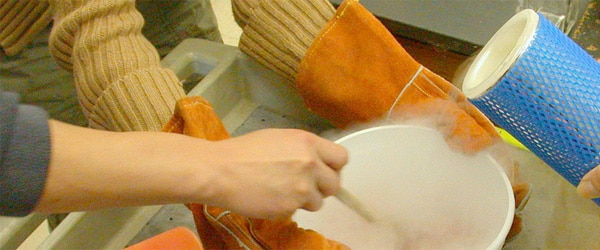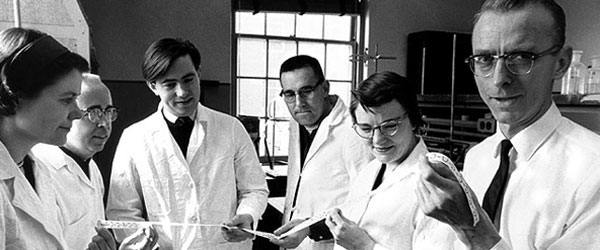5 Ways to Destroy your Agarose Gel and How to Avoid Them!
Pouring and running an agarose gel should be a simple and routine procedure, but there are a surprising number of ways to destroy your agarose gel.
Join Us
Sign up for our feature-packed newsletter today to ensure you get the latest expert help and advice to level up your lab work.


Pouring and running an agarose gel should be a simple and routine procedure, but there are a surprising number of ways to destroy your agarose gel.

Fluorescent tags are widely used for microscopy and expression studies – but it wasn’t so long ago that this everyday tool was unheard of. In this article we’ll talk about how GFP came to be, and what it means for you. Green fluorescent protein, or GFP, was first identified in a fluorescent jellyfish, Aequorea victoria….

Let’s face it: when you said you read that paper, what you really meant was that you read the abstract. And that conference you went to? You probably scanned the abstracts of the posters instead of actually attending the poster session and chatting with the presenters. It’s a dirty little secret and a time-saving tool…

The last step in western blotting is imaging the blot – this is the moment of truth, when you finally get to see the results of the experiment you’ve been working on for so long! There are a variety of different ways to image your blot. The method you choose will largely depend on the…
Most scientists I know approach the publication process with fear and trembling: the endless discussions about what journal to submit to, the agonized consideration of impact factors, comparing the all-important “time to first decision”, etc. Now that I’ve been working for a scientific publisher for a few months, I’m surprised at how many manuscripts still…

The first step in most Western blotting experiments is lysing your cells to extract protein. You need to break open your cells in order to be able to isolate the proteins, and you need to do this with the least degradation and the most reproducibility possible. Depending on what your starting material is, there are…

Following closely on the heels of Cristy’s article “How to Clean a Waterbath”, I’d like to take a moment to rant about a few other hated (and carefully avoided) lab tasks. Here are my top ten LEAST favorite things to do in the lab: What’s YOUR most hated lab task?

When running a quantitative Western blot, it’s crucial that your sample preparation is consistent. Incomplete protein extraction from one sample will skew your results when you compare it to the protein content of a sample that was extracted more thoroughly. And after the protein extraction, it’s important to handle the samples in an identical manner…

When it comes to choosing a molecular weight marker to run on your SDS-PGE gels, there are a lot of options out there. How do you know which one is right for you? Read on for tips on what to consider when choosing a standard for your protein gels. Before you go about selecting a…

I think that transferring Western blots is one the most enjoyable tasks to do in a lab: it’s quick, it’s messy, and on some gleeful level, it feels like a child’s art project gone wrong. Of course, it’s also finicky and slippery and prone to tiny pitfalls that can noticeably affect the quality of your…

For Western blot data to be reliable, it is important that you load known amounts of sample into each lane of the gel. This is of particular importance if you are doing a quantitative blot, where you really need to be able to compare band intensity in each sample. In this article, we’ll talk about…

For applications such as site-directed mutagenesis, it is often recommended that you use a proofreading polymerase (also known as high-fidelity polymerases) to minimize the risk of introducing unintended point mutations. But what is a proofreading polymerase? What makes them different from other polymerases? And when should you use them? Read on to learn more… What…
Most site-directed mutagenesis protocols strongly recommend that you use only PAGE- or HPLC-purified primers to mutate plasmid templates. Using purified primers is supposed to minimize the introduction of unintended mutations, thus drastically improving the probability of generating your desired mutant. However, specially purified primers can be extremely expensive, and take longer to synthesize than standard…

Working with RNA is definitely an acquired skill. It’s a lot more finicky than working with DNA, and requires careful attention to detail in order to avoid disastrous through RNase contamination. Here are a few common ways to lose your hard-earned RNA: 1. Don’t keep everything on ice Keeping the temperature of all of your reagents cool is…

Restriction enzymes are a basic tool in the molecular biologist’s arsenal. They’re super easy to use, and virtually essential for cloning and other applications. Restriction enzymes are also a great example of a perfect “tool” from nature that scientists have co-opted for their own use. Here are a few fun facts about restriction enzymes that…

Good organization is essential for keeping a lab in good running order. Databases of strains, plasmids, primers, and stocks are useful for keeping track of your materials, and allow your work to be continued easily after you’ve left the lab. In this article, I’ll talk about a few tools in Microsoft Excel that will make…

Transforming yeast with DNA is a very similar process to transforming E. coli, but with just enough differences to trip you up if you let your attention slip. Whether you’re doing a yeast two-hybrid screen, or using yeast as a model system, here are a some mistakes to to avoid… 1. Forgetting to add single…

Virtually every research scientist has a use for sterile technique in the lab, whether you study infectious microorganisms, do tissue culture, or use E. coli for cloning. Good sterile technique is a basic lab skill required to avoid contamination of your materials and experiments; and fortunately, the principles are simple to learn and easy to…

Western blotting is a common lab technique used to detect and analyze proteins. It also happens to be a really long and complicated procedure, with many steps along the way that are easy to mess up. How do you make sure that your Western blot is successful? Avoid the following five ways to destroy your…
I learned most of my molecular biology skills in the first lab I worked in almost 10 years ago. I realized recently that I was in desperate need of a refresher course, so I did a little bit of reading to see if I could improve the efficiency of my cloning reactions. In the process,…

Research is a challenging field that demands a tremendous amount of skill and dedication. We are required to be creative but logical, independent but team players, innovative but grounded, proliferative but focused. This balancing act requires not only a very broad set of skills and talents, but also the ability to manage it all with…

Primer design can sometimes feel like more of an art than a science, and designing the best primer can significantly affect the success or failure of your experiments. Here are a few tips on optimizing primer design for several different applications: PCR amplification/cloning One of the most common primer-based applications is cloning. The desired amplicon…
We recently featured an article about how to streamline your cloning. But what about those days when you have too much on your plate, and need to put some things off until later? Here are a few hints on where you can pause in your cloning experiments while working on other projects: We sent a…

We recently had a feature from Jode on everyday equipment that you can use in the lab, but what about the other way around? Do you ever take a look at what you’re doing in the lab and think, “Wow, this would really come in handy at home?” Here are a few of the things…
I always keep an ear open for helpful tips in the lab – those little tricks that can make your experiments faster, easier and better. Here are a few tricks I’ve picked up for trimming down the time it takes to do your cloning: Restriction digestsMany digests are complete within 10 minutes of digestion at…

In an ideal world, every PI would be a nurturing and challenging mentor who carefully guides your project and is invested in developing your skills as a scientist. In the real world, however, that kind of leadership can be hard to find. In any case, one of the most important and useful mental steps you…
Presenting your work is a fantastic opportunity to get feedback on your project, demonstrate the significance of your results, and make the connections that will enhance your future career. And yet, how many incomprehensible lab meetings have we all sat through? How many seminars have you attended that left you feeling more confused than inspired?…

The eBook with top tips from our Researcher community.